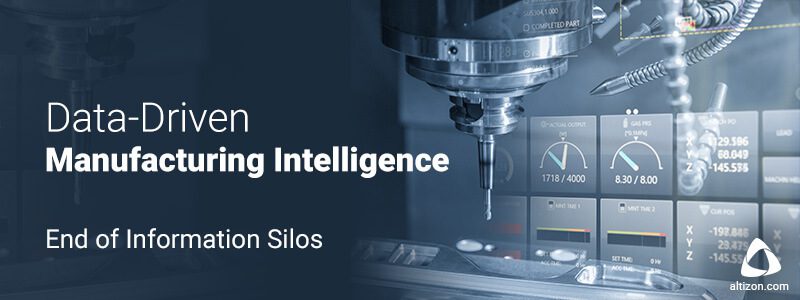Data-driven Manufacturing Intelligence: End of Information Silos
Your assets and systems data is an important business asset. Make it count!
In a semi-automated to an automated factory, machines, sensors, and various OT systems on the shop floor generate data about assets’ health or operations. This data is used for monitoring, maintenance, and the basic management of the assets and the production line. However, much of this data remains in ‘information silos’ within the functional groups, singular systems or the factory.
A higher degree integration of contextual data coming from many different systems (data sources) can not only improve the efficiency and speed up production processes but also help build deeper manufacturing business intelligence and make data-driven decisions. The time is to break the information silos and technology is a way to do that.
Open your data systems – right data at the right time at the right place
The digital technology world is far more open. Several open source systems and platforms are thriving. Numerous integrations are taking place to build the ecosystem. Manufacturing world also needs to look at opening their world. Breaking up the information silos and unleashing the potential of context data from the Internet of Things and other systems, using Big Data and AI services on the cloud, could allow the right data to arrive at the right place at the right time.
No longer human dependency or intervention is needed to take the next actions. It can instead be shared between machines in a trustworthy manner to achieve higher degrees of efficiency and automation. This means processes can be adjusted to put machines to work in ways that make them most productive, whilst your employees are given higher-value tasks that only humans can and should perform. If the machines or OT systems data is shared with enterprise resource planning (ERP) or quality management systems (QMS) and vice-a-versa in a trusted manner, greater efficiencies can be achieved.
Transforming Your Manufacturing Big Data into “Insights – knowledge – Intelligence”
In our journey of helping digital transformations for many global manufacturing enterprises, we have noticed that the organizations that use IIoT initiatives to integrate their OT and IT systems are far more enjoying the benefits of digital transformation. Such organizations are way ahead in their machines and systems communication and coordination. In one such case at an automotive manufacturer, machines and OT systems data is collected and processed into Manufacturing IoT solution and this data is then integrated with their ERP systems.
Daily planning is picked up from the ERP system for the machines and dynamic replanning is done in case of gap between planned Vs actuals, without any human intervention. Similarly, in another place, energy consumption data is collected at the machine and cell level, which is used for energy profiling. Looking at the usage pattern for a period of time, further energy needs and/or leakages are predicted and also a correlation is established with the machine’s efficiency and maintenance needs.
According to Forbes, “it is predicted that by 2020, around 50 times more digital data generated compared to that of today from over 200 billion connected devices”, making it digital chaos.
Hence, finding systematic ways to transform your big data into knowledge is therefore of higher importance than ever before, both to maintain an overview of important insights but also to stay ahead of competitors by building manufacturing intelligence like never before. After all, your data is basic information, this information gives insights. And a good open platform to share this data in a trusted manner, use analytics strategy to build correlations and prediction, can lead to greater intelligence and build a competitive advantage.




